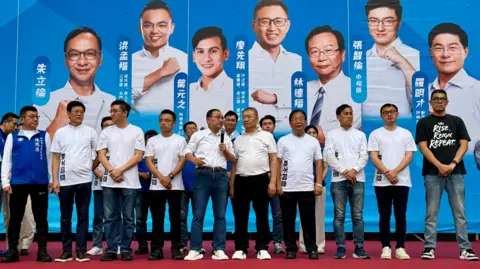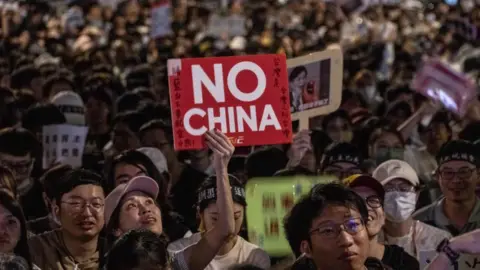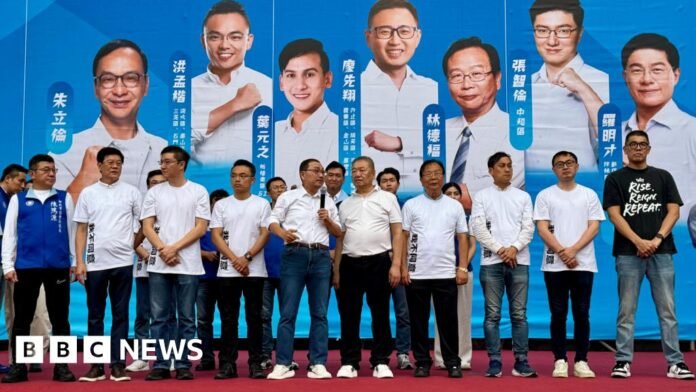BBC News, Asia Digital Reporter
 BBC / Tessa Wong
BBC / Tessa WongEarly results of an unprecedented vote in Taiwan aimed at ousting politicians accused of being too close to China indicate that all have retained their seats.
Thousands of Taiwanese went to the polls on Saturday in what has been termed as the “dabamian”, or Great Recall vote, initiated by a civic movement.
The vote result was closely watched as it could have altered the balance of power in Taiwan, which has seen months of political deadlock between the Democratic Progressive Party (DPP) government and the legislature dominated by the opposition Kuomintang and its allies.
But the early result shows the opposition keeps its majority. A small number of votes are still being counted.
On Saturday, citizens in 24 districts – all held by the Kuomintang – voted on a simple yes or no question: whether they agreed to boot out their legislator.
While Taiwan held recall votes in the past, it had never seen so many within such a short period of time.
Early results show that a majority of voters in every district voted no, which means none of the lawmakers have to vacate their seats.
The opposition maintains its slim majority – for now. Another round of recall voting will be held in August for seven other seats.
Analysts have said that if the Great Recall fails, it would intensify political polarisation in Taiwan, and embolden politicians to do what they want despite opposition from a significant segment of the population.
The Great Recall has deeply divided Taiwanese society, which has seen large rallies and fierce debate. Both pro-recall and anti-recall activists claimed to be fighting for Taiwan’s democracy.
What’s behind the Great Recall ?
It began with elections in January 2024, when voters chose the DPP’s William Lai as their president but gave the opposition the dominant presence in the parliamentary Legislative Yuan.
In the following months, the main opposition party Kuomintang worked together with the smaller Taiwan People’s Party and independents to block DPP bills and pass controversial pieces of legislation.
These moves angered some Taiwanese, who saw these as attempts to stymie the DPP government while strengthening the opposition’s parliamentary power.
In May 2024, thousands began holding protests in what became known as the Bluebird movement, partially named after the Taipei street where many had gathered.
Many in the movement believe the opposition, led by the Kuomintang which is known for its relatively friendlier position on China, is being influenced by Beijing and secretly pushing China’s agenda in Taiwan’s legislature.
The party has denied this, but suspicion grew when a group of Kuomintang lawmakers visited China last year and were welcomed by top-ranking Chinese Communist Party official Wang Huning.
Civic groups in the Bluebird movement launched petitions to oust various Kuomintang lawmakers, while Kuomintang supporters retaliated by doing the same to some DPP lawmakers.
In the end, petitions for 31 lawmakers’ seats received enough preliminary support to proceed with a final recall vote. All these seats were held by the Kuomintang.
 Getty Images
Getty ImagesVoter turnout has been seen as crucial for the Great Recall’s success. Each district’s seat can only be vacated if the number of votes exceed 25% of registered voters and more than half approve of the recall.
In recent weeks civic groups have been relentlessly flooding social media platforms and pounding the streets canvassing for votes.
Meanwhile the Kuomintang and its allies have held rallies urging voters to say no to the recall.
They have alleged that the DPP masterminded the Great Recall and Bluebird movement in order to overturn the results of the election and gain power in the Legislative Yuan.
The DPP had initially sought to distance itself from the Great Recall movement. But eventually it showed its support, with Lai stressing that the DPP “must align with the power of the people” and ordering party officials to assist pro-recall groups to “protect the nation”.
Beijing has also waded into the debate while watching from afar.
Its Taiwan Affairs Office has accused Lai of “engaging in dictatorship under the guise of democracy” and “using every means possible to suppress the opposition”.







